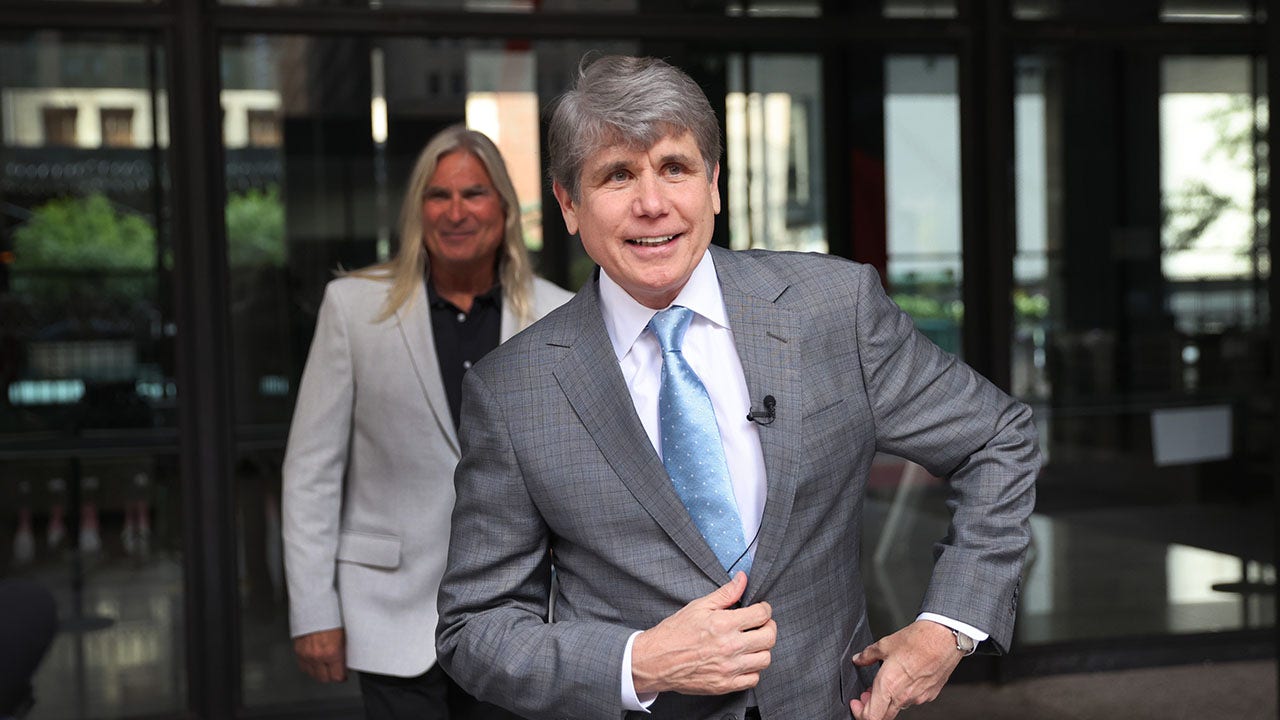World
G7 Hiroshima Summit: Who’s attending, what will be discussed?
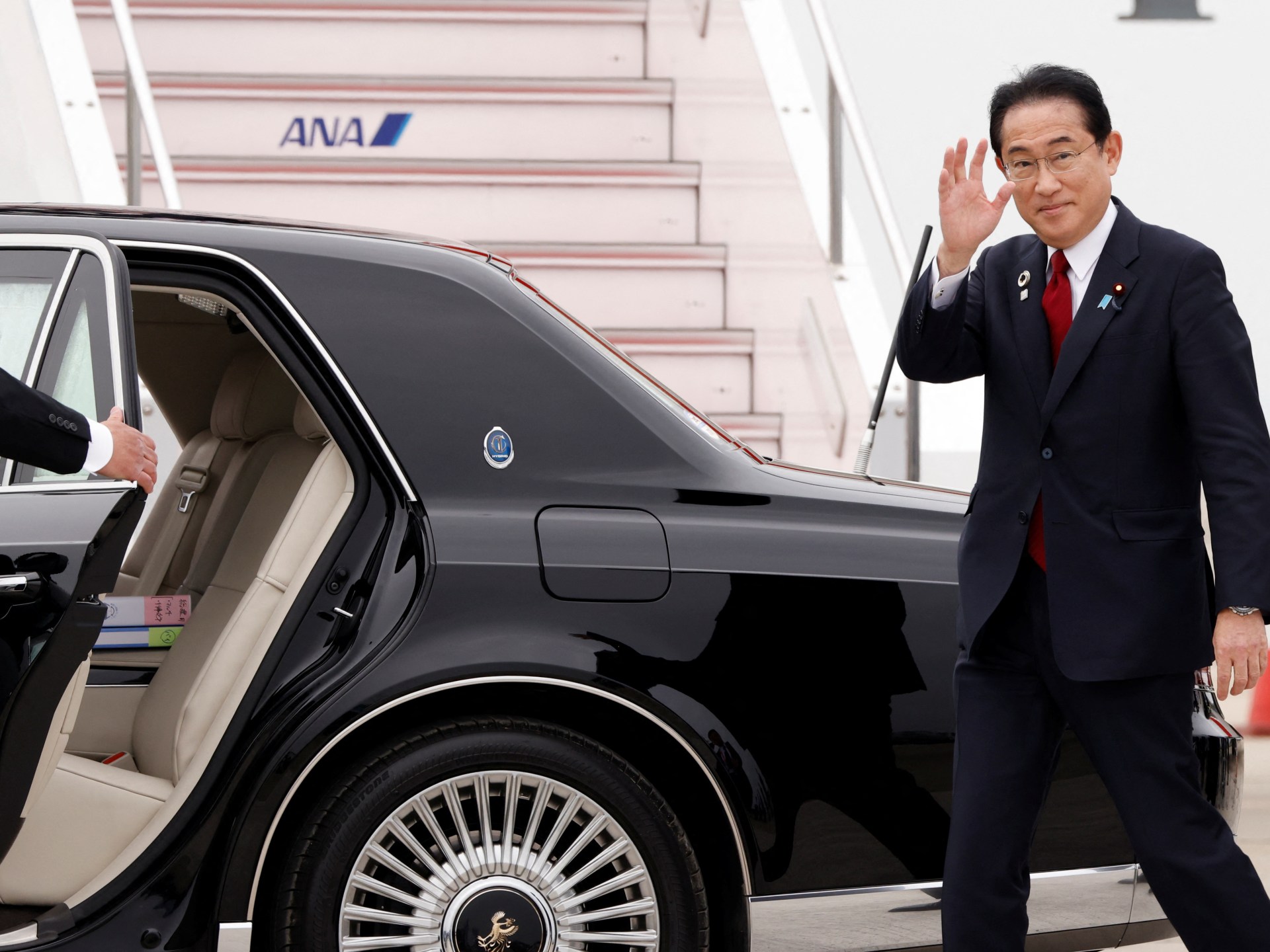
Leaders of the G7 meet in the southern Japanese city of Hiroshima for their annual summit from May 19 – 21.
The are expected to discuss not only economics, but politics, and Russia’s February 2022 full-scale invasion of Ukraine. China, which has become increasingly assertive in its claims in the disputed South China Sea and over self-ruled Taiwan, is also likely to be an issue along with North Korea’s weapons testing.
Here’s a look at the G7 and what to expect:
What is the G7 Summit?
The Group of Seven (G7) is an informal group of leading industrialised democracies with no permanent secretariat or legal status. It consists of Canada, France, Germany, Italy, Japan, the United Kingdom and the United States.
The group was founded – as the G6 – following the 1973 oil crisis as a forum for the richest nations to discuss global economic issues. Its countries have a combined annual gross domestic product (GDP) of $40 trillion – making up just under half the world economy.
The founding members held their first summit in 1975 in France to discuss how to tackle the deep recession that followed the embargo imposed by the oil production cartel OPEC. Canada became the seventh member a year later.
Russia joined to form the G8 in 1998, but was expelled after Moscow’s 2014 annexation of Crimea.
The presidency of the summits revolves among the seven members, and this year it is Japan’s turn to host. In 2024, it will be Italy.
Two representatives of the European Union (EU) also join, and it has become customary in recent years for leaders from some non-G7 countries and international organisations to take part in some sessions.
The leaders discuss a wide range of issues, including economic policy, security, climate change, energy and gender.
Who is attending?
This year, the leaders of Australia, Brazil, Comoros (chair of the African Union), Cook Islands (chair of the Pacific Islands Forum), India (G20 president), Indonesia (chair of Association of Southeast Asian Nations), South Korea and Vietnam are invited, reflecting Japanese Prime Minister Fumio Kishida’s stress on the importance of reaching out to developing countries, as well as US allies and partners.
The invitations to leaders outside the G7 are meant to extend cooperation to a broader range of countries.
But the economic expansion of nations including Brazil, China and India (all members of the BRICS grouping which also includes Russia and South Africa) has raised questions about the G7′s relevance and its role in leading a world economy that is increasingly reliant on growth beyond the wealthiest nations.
Leaders of the United Nations, the International Energy Agency, the International Monetary Fund, the Organization for Economic Cooperation and Development, the World Bank, the World Health Organization and the World Trade Organization are also on the guest list.
What will be discussed?
The summit comes just days after Ukrainian President Volodymyr Zelenskyy completed a whirlwind trip arond Europe to meet a number of the G7 leaders.
Zelenskyy’s tour was aimed at building political support ahead of a widely anticipated counteroffensive to reclaim lands occupied by Moscow’s forces, and securing new weapons commitments.
G7 leaders are expected to strongly condemn Russia’s war on Ukraine while pledging their continuing support for Ukraine. Zelenskyy will join the session via the internet.
“Support for Ukraine and sanctions against Russia will be the main topics of discussion,” Japan’s Finance Minister Shunichi Suzuki told a news conference. “We will continue to closely coordinate with G7 and the international community to enhance the effect of sanctions to achieve the ultimate goal of prompting Russia to withdraw.”
![A group of activists take part in a protest against the G7 Leaders' Summit in Hiroshima on May 17, 2023, holding placards that say, "No G7! Imperialist summit! No nuclear war! Hands off Ukraine! No war on China!" [Yuichi Yamazaki/AFP]](https://www.aljazeera.com/wp-content/uploads/2023/05/33FC926-highres-1684395134.jpg?w=770&resize=770%2C512)
There will also be a focus on Beijing’s escalating threats against Taiwan, the self-governing democratic island Beijing claims as its own, and ways to reduce Western democracies’ economic and supply chain dependency on China.
The seven leaders have also signalled that China’s use of punitive trade measures will be high on the agenda of their three-day annual summit.
China’s use of coercive economic moves has been an issue of growing concern in the Asia Pacific and Europe in recent years, with Japan, South Korea, Australia and Lithuania all facing trade restrictions following disputes with Beijing on issues ranging from the origins of the COVID-19 pandemic to Taiwan.
For developing nations, including many former colonies of Western powers with varied views on and ties to Russia and China, the G7 is set to offer more support in health, food security and infrastructure to help underpin closer ties.
Developed countries promised in 2009 to transfer $100bn annually between 2020 and 2025 to vulnerable states hit by increasingly severe climate-linked impacts and disasters – but that target was never met.
Rich G7 nations owe poor ones an estimated $13 trillion in unpaid development aid as well as support in the fight against climate change, according the British NGO Oxfam.
Not originally on the agenda, the rapid growth of generative artificial intelligence (AI) chatbot ChatGPT means G7 leaders can no longer ignore the issues it raises.
In April, Kishida met the CEO of OpenAI, which developed the ChatGPT service, and EU legislators have urged G7 leaders to find ways to control its development.
G7 digital ministers agreed in April they should adopt “risk-based” regulation on AI.
Choice of venue
Hiroshima is Kishida’s hometown, and known throughout the world as the first city to be hit by a nuclear weapon. The 1945 bombing helped end World War II, but devastated Hiroshima and Nagasaki killing thousands of civilians.
Kishida’s choice of venue reflects his determination to put nuclear disarmament and non-proliferation at the top of the summit’s agenda.
A path to nuclear disarmament has appeared more difficult with Russia’s recent nuclear weapons’ threats in Ukraine, as well as North Korea’s repeated ballistic missile tests and Iran’s expansion of its nuclear programme.
“I can’t say that the G7 will resolve these non-proliferation crises, but without a coherent position from the G7 we have no chance,” a senior G7 diplomat told the Reuters news agency.
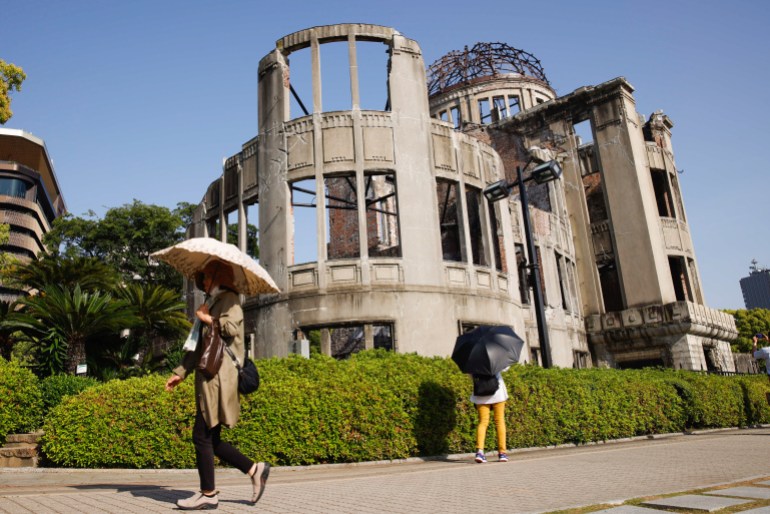
Kishida on Friday will welcome arriving leaders at the Hiroshima Peace Park, the city’s commercial and political heart at the time the bomb was dropped. He also plans to escort the leaders to the A-bomb museum, in the first group visit involving the heads of some of the world’s nuclear-armed states. There might also be a meeting with atomic bomb survivors.
“I believe the first step toward any nuclear disarmament effort is to provide a firsthand experience of the consequences of the atomic bombing and to firmly convey the reality,” Kishida said last Saturday during a visit to Hiroshima to observe the summit preparations.
On the sidelines
Kishida, US President Joe Biden and South Korean President Yoon Suk Yeol are expected to hold a trilateral meeting lon the sidelines of the Hiroshima summit to discuss North Korea, China’s assertiveness and Russia’s war on Ukraine.
Kishida and Yoon will pay their respects together at a Hiroshima memorial for Korean atomic bomb victims in a trust-building gesture as the two countries repair ties strained by disputes stemming from Japan’s 1910-1945 colonial rule of the Korean Peninsula.
Yoon was invited to the summit as one of eight outreach nations.
Protests have also taken place in the run-up to the summit,

World
Nike’s Vietnam Manufacturing Shift Puts It in Trump’s Tariff Crosshairs

For the past two decades, Nike has worked to gradually diversify its manufacturing beyond China, with Vietnam emerging as the company’s most important market for production. On Wednesday afternoon, President Donald Trump announced reciprocal tariffs that will impact Vietnamese-made goods more than those from almost any other country.
The impact of those import tariffs will be far-reaching across the global economy—shortly after the announcement an S&P 500 ETF fell 2%. They will particularly impact the companies that import the bulk of their goods from the countries with the highest rates. On Trump’s list, Vietnam had the fourth highest rate at 46%, trailing only Cambodia (49%), Laos (48%) and Madagascar (47%).
In fiscal 2024, factories in Vietnam manufactured 50% of all Nike Brand footwear, by far its largest market. Factories in Vietnam also manufactured 28% of all Nike Brand apparel, also its largest market.
The second most important manufacturing market for Nike is likely China. The country accounts for 16% of Nike apparel manufacturing, second only to Vietnam, and 18% of footwear, third behind Vietnam and Indonesia. Trump’s new tariffs include a 34% rate on China-made goods, but White House officials told CNBC that the those tariffs would come on top of the 20% already imposed on Chinese imports. That implies a true tariffs rate of 54%.
Nike stock (NYSE: NKE) fell 7% in after-market trading.
Representatives for Nike didn’t immediately respond to an email seeking comment. Tariffs only came up once on the company’s latest earnings call on March 20, with CFO Matthew Friend mentioning specifically that the company’s latest guidance included newly implemented tariffs on imports from Mexico and China. Those tariffs are separate from the ones announced this week.
Throughout the 1990s Nike was frequently criticized for the labor conditions of its overseas factories, particularly those in China. Since then, the company has worked to diversify its supply chain. It’s not alone—U.S. companies of all sorts have spread out their manufacturing in that span, some searching for lower prices, others looking to insulate themselves from potential volatility and geopolitical relations between the U.S. and Chinese governments.
Vietnam quickly emerged as Nike’s most important market for manufacturing. In 2001, for example, Vietnam accounted for just 13% of the company’s footwear goods and was not included in a list of 12 countries that accounted for most of Nike’s apparel manufacturing, according to SEC filings. A decade later, in 2011, Vietnamese factories were making 39% of Nike’s footwear, its biggest market, and appeared to be third for apparel. It became the company’s most important country for apparel manufacturing for the first time in 2020 and has remained at the top in both categories ever since.
The Nike filings only list where the goods are made, and not where they are sold. That’s likely more relevant in China—many companies are more intentional about selling China-manufactured goods in China—than it is in Vietnam, which has a population that is about 1/14th of its northern neighbor.
Indonesian factories accounted for 27% of Nike footwear in 2024, according to the filing, which put it in front of China and behind Vietnam. Trump’s announcement included a 32% tariff on Indonesian goods. The third most important country for manufacturing Nike clothing was Cambodia, at 15% of the company’s apparel. The Cambodian tariff rate of 49% was the highest of any rate announced Wednesday.
World
Canada's PM Carney vows to ‘fight’ Trump’s tariffs, other world leaders weigh impact
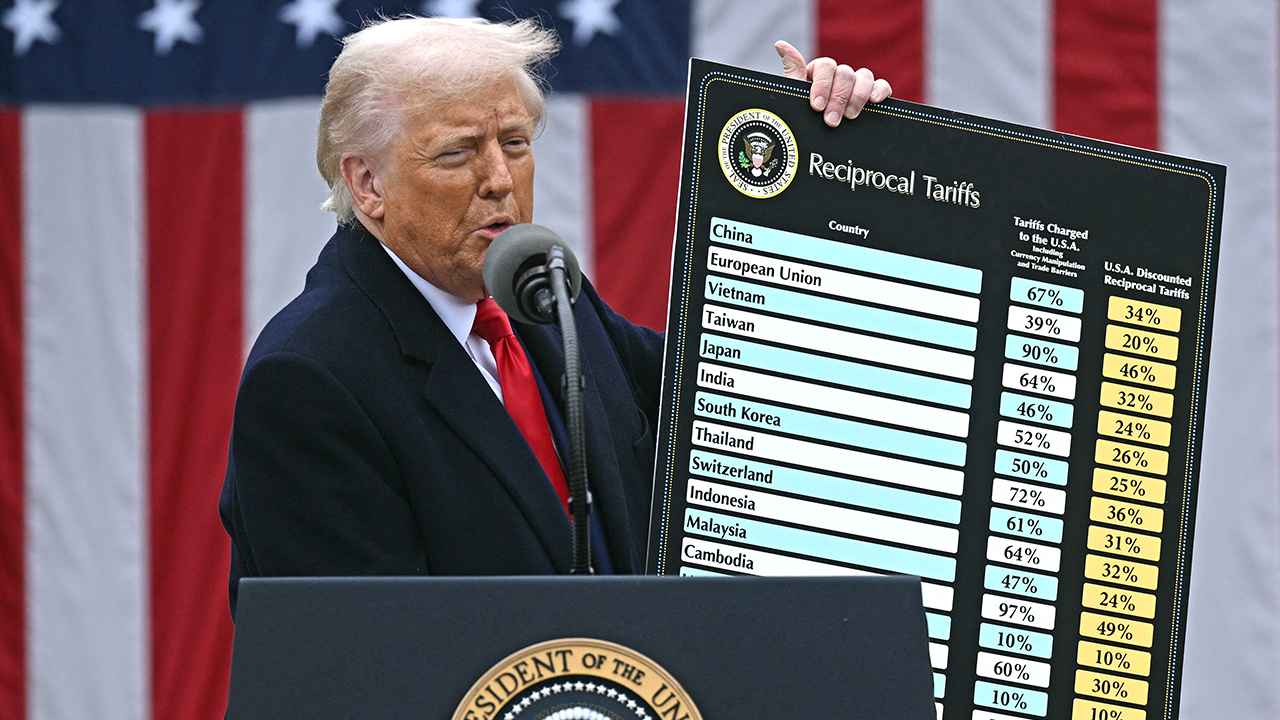
Canadian Prime Minister Mark Carney on Wednesday evening vowed to “fight” the new round of tariffs announced by President Donald Trump, and said he would turn to other international partners to get through the rocky times ahead.
“President Trump has just announced a series of measures that are going to fundamentally change the international trading system,” Carney told reporters following Trump’s Rose Garden announcement. “We’re in a situation where there’s going to be an impact on the U.S. economy, which will build with time.
“In our judgment, it will be negative on the U.S. economy that will have an impact on us,” he added, noting millions of Canadians will be impacted.
Prime Minister Mark Carney holds a press conference following the First Ministers Meeting at the National War Museum on Friday, March 21, 2025. (Sean Kilpatrick/The Canadian Press)
WHICH COUNTRIES IMPOSE THE HIGHEST TARIFFS ON THE US?
While Trump did not issue any additional tariffs against Canada following the 25% tariffs already in place on all Canadian imports, the 10% tariff on its energy exports and the blanket tariff on all aluminum and steel, he did announce a 25% tariff on all foreign vehicle imports.
He also pointed out that Trump said there could be future targeted tariffs against pharmaceutical companies, lumber and semiconductors — tariffs that will have wide affect on U.S. trading partners beyond Canada and Mexico, but across Europe and Asia.
“In a crisis, it’s important to come together,” Carney said. “It’s essential to act with purpose and with force, and that’s what we will do.”
Before the tariff announcement, Canadian Conservative Leader Pierre Poilievre said at an election campaign event on Wednesday that he supports “targeted, reciprocal” tariffs on American goods — and if his party wins the general election on April 28 and he becomes prime minister, he would like to sit down with President Donald Trump and create a new trade deal, replacing the United States-Mexico-Canada Agreement, which the president signed in 2020.
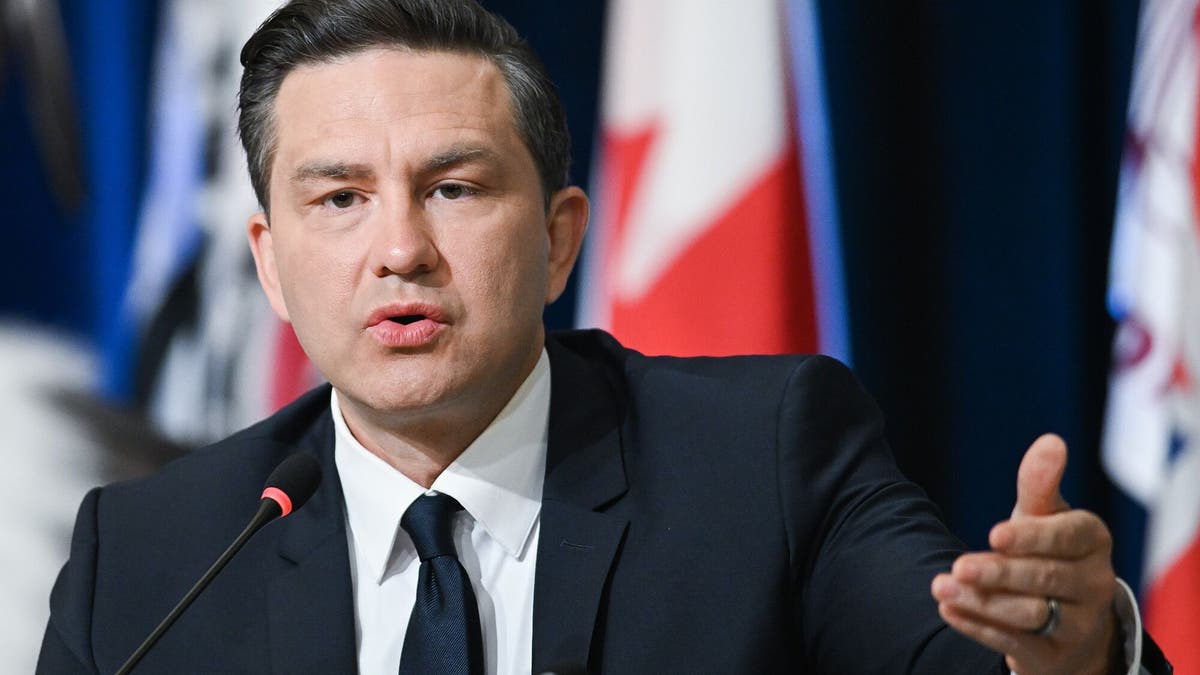
Pierre Poilievre, leader of Canada’s Conservative Party, speaks at the Assembly of First Nations Annual General Assembly in Montreal, Quebec, Canada, on Thursday, July 11, 2024. (Graham Hughes/Bloomberg via Getty Images)
Poilievre also said that Canada must maintain control of its border and freshwater and protect both its automotive industry and supply-managed farm sectors.
David Adams, president and CEO of Global Automakers of Canada — a national trade association representing the Canadian interests of 16 automakers, including BMW Canada, Inc. and Nissan Canada Inc. — said in a statement, “Tariffs are taxes that hurt consumers by increasing costs, driving up inflation, and unfairly impacting workers on both sides of the border.”
“Governments should look to long-term solutions to remove these tariffs, prioritizing the elimination of regulatory barriers to industry competitiveness and providing automakers with flexibilities to respond in these uncertain times.”
Reactions from European Union leaders began to emerge following Trump’s announcement that he will hit the EU with 20% tariffs on all imported goods, with disappointment, concern and commitments to continue negotiations with the U.S.
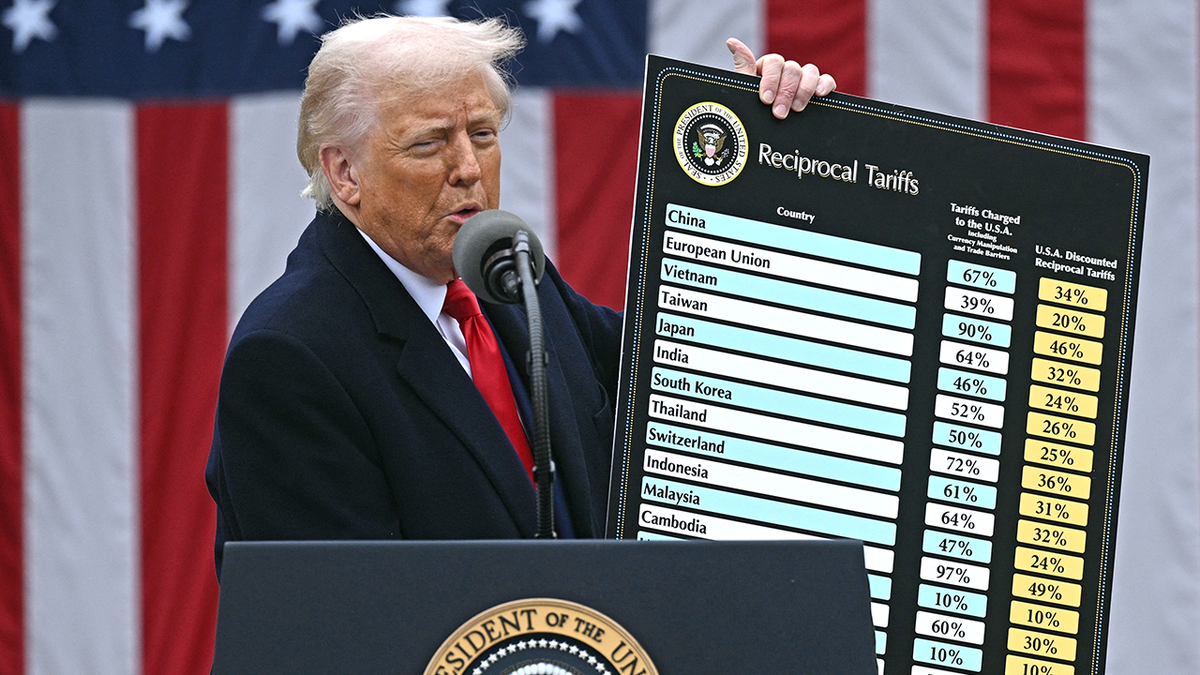
US President Donald Trump holds a chart as he delivers remarks on reciprocal tariffs during an event in the Rose Garden entitled “Make America Wealthy Again” at the White House in Washington, DC, on April 2, 2025. (Getty Images)
CANADA STARES DOWN CONSEQUENCES OF TRUMP TARIFF WAR: JOB LOSSES, GROCERY PRICE HIKES, POSSIBLE RECESSION
Italian Prime Minister Giorgia Meloni, generally seen as a Trump ally, said Trump’s tariffs were “wrong” and warned they would not only harm American and European pocketbooks, but aid Western adversaries.
“We will do everything we can to work towards an agreement with the United States, with the goal of avoiding a trade war that would inevitably weaken the West in favor of other global players,” Meloni said in a statement on Facebook.
“In any case, as always, we will act in the interest of Italy and its economy, also engaging with other European partners,” she added.
Ireland’s Deputy Prime Minister, Simon Harris, said he “deeply regret[s]” the new tariffs but said he is committed to working with Washington to end this tariff war.
“I must be honest tonight that a 20% blanket tariff on goods from all EU countries could have a significant effect on Irish investment and the wider economy,” he said, noting the effects would “likely be felt for some time.”
Chairman of the European Parliament’s International Trade Committee Bernd Lange called for a united response from countries targeted by Trump.
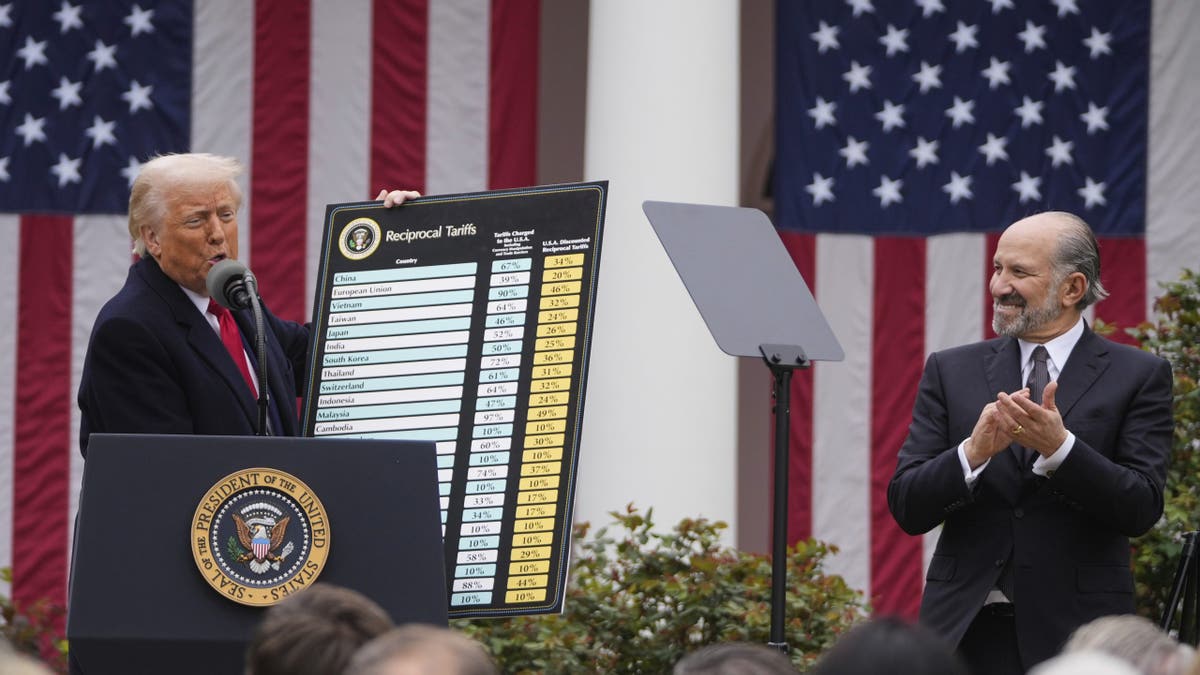
President Donald Trump speaks during an event to announce new tariffs in the Rose Garden at the White House, Wednesday, April 2, 2025, in Washington, as Commerce Secretary Howard Lutnick listens. (AP Photo/Mark Schiefelbein)
“While President Trump might call today ‘Liberation Day,’ from an ordinary citizen’s point of view this is ‘Inflation Day,’ he said, reported Reuters. “Because of this decision, U.S. consumers will be forced to carry the heaviest burden in a trade war.”
Lange said the EU will respond through “legal, legitimate, proportionate and decisive” measures.
Swiss President Karin Keller-Sutter said her government would work to figure out the next steps.
The U.K., along with the president of Mexico ahead of the announcement, said they would continue to work with the U.S. and would not rush to enforce reciprocal tariffs.
Similarly, Australian Prime Minister Anthony Albanese said that while Trump’s decision was “not the act of a friend,” his country would not impose reciprocal tariffs, reported Reuters.
He reportedly condemned the U.S. tariffs as totally unwarranted and said Australia will continue to negotiate to have the tariffs lifted.
World
‘A historic moment’: Donald Trump unveils sweeping ‘reciprocal’ tariffs

United States President Donald Trump has unveiled his long-anticipated “reciprocal tariffs”, in a move that is expected to rattle global trade relations.
On Wednesday, Trump appeared in the White House Rose Garden, where the colonnades had been draped with large US flags, to sign the executive orders authorising the tariffs.
He framed the tax hikes as a blow against unfair trade practices, painting a portrait of the US as a country exploited by even its closest allies.
“For decades, our country has been looted, pillaged, raped and plundered by nations near and far, both friend and foe alike,” Trump told an audience of manufacturing workers, cabinet members and journalists.
“ Foreign leaders have stolen our jobs. Foreign cheaters have ransacked our factories. And foreign scavengers have torn apart our once-beautiful American dream.”
But he proclaimed that Wednesday would mark a turning point in US history, marking an end to the “vicious attacks” he said the country had weathered.
“ April 2, 2025, will forever be remembered as the day American industry was reborn, the day America’s destiny was reclaimed,” Trump said.
Invoking the International Emergency Economic Powers Act of 1977, Trump announced a 10-percent tariff on all countries, scheduled to take effect on April 5.
Then, he revealed there would be “individualised” tariffs for countries that have the largest trade deficits with the US. Those tariffs would come into effect four days later, on April 9.
Trump explained that his team calculated the “individualised” tariffs by taking half of what he claimed those countries had charged the US for its exports.
“ We will charge them approximately half of what they are — and have — been charging us. So the tariffs will be not a full reciprocal,” Trump said. “I could have done that, I guess, but it would’ve been tough for a lot of countries. We didn’t want to do that.”
He then beckoned Commerce Secretary Howard Lutnick to the Rose Garden podium with a chart that illustrated some of the upcoming tariffs.
The graph showed the European Union was headed for 20-percent tariffs. China, meanwhile, had been assigned 34 percent. Vietnam would receive 46 percent, and Thailand 36 percent.
Noticeably absent were Mexico and Canada, the US’s two largest trading partners and its immediate neighbours.
Those countries, the White House explained, would remain under punitive tariffs, designed to bring them in line with Trump’s policies on border security.
All goods not covered under the US-Mexico-Canada free-trade agreement would face a 25-percent tariff, with the exception of energy products. They face 10-percent tariffs instead.
Wednesday’s announcement, while widely expected, still sent shockwaves across the globe.
“Long story short, this is a historic moment,” said Dan Ciuriak, the director of the Canada-based Ciuriak Consulting firm, giving a nod to the isolationist policies of the Trump administration.
“I think it will reshape the world. I think we are seeing the possibility of the emergence of something like a ‘Fortress North America’.”
He noted that poorer countries in places like Southeast Asia appear to be among the hardest hit by the impending tariffs.
“ The developing countries have been hit by very, very high tariffs. And that will have geopolitical ramifications,” Ciuriak said.
“These countries are the poorest in the world, and the notion that they have been getting rich on the back of American workers is not very tenable. I don’t think that this is going to play well in the rest of the world. So we will see, I think, tectonic shifts in international relations as a result of that.”

Within minutes of Trump’s announcement, the international backlash started to erupt, with world leaders denouncing the sweeping tariffs as unjustified.
“The unilateral action that the Trump administration has taken today against every nation in the world does not come as a surprise,” Australian Prime Minister Anthony Albanese said in a news conference. “But let me be clear: They are totally unwarranted.”
Australia faces 10-percent tariffs from the Trump administration. Like many leaders, Albanese pledged to protect his country’s workers from the repercussions of those taxes.
“The administration’s tariffs have no basis in logic, and they go against the basis of our two nations’ partnership. This is not the act of a friend,” he added.
Ireland’s Taoiseach Micheal Martin, meanwhile, offered a broad message warning of the damage to both global trade relations and to the US’s own consumers.
“I strongly believe that tariffs benefit no one. They’re bad for the world economy. They hurt people. They hurt businesses,” he said. “So I regret deeply the decision of the US administration this evening to levy a tariff of 20 percent on all goods imported from the European Union.”
Even Canada, which was exempt from the so-called reciprocal tariffs, chimed in with its outrage over the US’s broader policy of lashing out at longtime trading partners.
“During this crisis, we must act with purpose and force,” Canadian Prime Minister Mark Carney wrote on social media. “My government will fight U.S. tariffs, protect Canadian workers and industries, and build the strongest economy in the G7.”
Canada is among the countries that have pledged to respond to the Trump administration’s tariffs with retaliatory measures. Other countries, including Mexico, have demurred: Earlier on Wednesday, Mexican President Claudia Sheinbaum said she would avoid pursuing “tit-for-tat” tariffs.
Experts say tariffs — a kind of import tax — very often fall on the shoulders of consumers.
Trump has framed his tariffs as a means of reducing trade deficits and bringing foreign manufacturing back to US shores. He also said he plans to use the tariffs to offset the US debt and pave the way for tax cuts.
But critics point out that trade deficits — when the money spent on exports is greater than earnings from imports — are not necessarily a bad thing. They can be a sign of consumer habits or a strong currency.
Opponents of the tariffs also argue that it will take years for new factories to be established in the US, making any economic benefit a distant prospect.
Reporting from the New York Stock Exchange, Al Jazeera correspondent Kristen Saloomey noted that market volatility has been an issue for investors this week, as they braced for the tariffs and the resulting economic uncertainty.
“President Donald Trump’s tariff announcement came after stock markets in the United States had closed in positive territory and immediately sent the futures market into negative territory, signalling another shaky start to the markets on Thursday,” Saloomey said.
What might follow Trump’s announcement, she added, is unclear. Economists have been watching stock market indexes like the S&P 500 for signs of what’s to come.
“Market analysts have been disagreeing as to whether or not we’ve seen the worst of this policy’s impact on markets,” Saloomey explained.
“Some have argued that — with a 10-percent drop in the S&P last month — markets had already priced in the cost of doing business with these tariffs. Others have warned that things might get worse with inflation and even a recession possible in the future as a result of these policies.”
But Trump and his allies have brushed aside fears of an economic downturn. From the Rose Garden, Trump offered a preemptive rebuttal to the foreign leaders who might “complain”.
“To all of the foreign presidents, prime ministers, kings, queens, ambassadors and everyone else who will soon be calling to ask for exemptions from these tariffs, I say: Terminate your own tariffs. Drop your barriers. Don’t manipulate your currencies,” Trump said.
He also signalled he felt the tariffs were relatively generous, given the abuse he felt the US had faced.
“We are being very kind. We’re kind people, very kind,” he said, before adding: “You are not so kind when you get ripped off.”
-

 News1 week ago
News1 week agoTrump Is Trying to Gain More Power Over Elections. Is His Effort Legal?
-

 News1 week ago
News1 week agoWashington Bends to RFK Jr.’s ‘MAHA’ Agenda on Measles, Baby Formula and French Fries
-

 News1 week ago
News1 week agoCompanies Pull Back From Pride Events as Trump Targets D.E.I.
-

 Technology1 week ago
Technology1 week agoTrump officials planned a military strike over Signal – with a magazine editor on the line
-

 World1 week ago
World1 week agoAt least six people killed in Israeli attacks on southern Syria
-

 Technology1 week ago
Technology1 week agoThe FBI launched a task force to investigate Tesla attacks
-

 World1 week ago
World1 week agoNo, Norway and Sweden haven't banned digital transactions
-

 Culture1 week ago
Culture1 week agoAnalysing Jamal Musiala’s bizarre corner goal for Germany against Italy







![H&R Block Tax Software Basic 2024 with Refund Bonus Offer (Amazon Exclusive) Win/Mac [PC/Mac Online Code] H&R Block Tax Software Basic 2024 with Refund Bonus Offer (Amazon Exclusive) Win/Mac [PC/Mac Online Code]](https://newspub.live/wp-content/uploads/2025/04/5181AWwUanL._AC_SL1080_-80x80.jpg)





